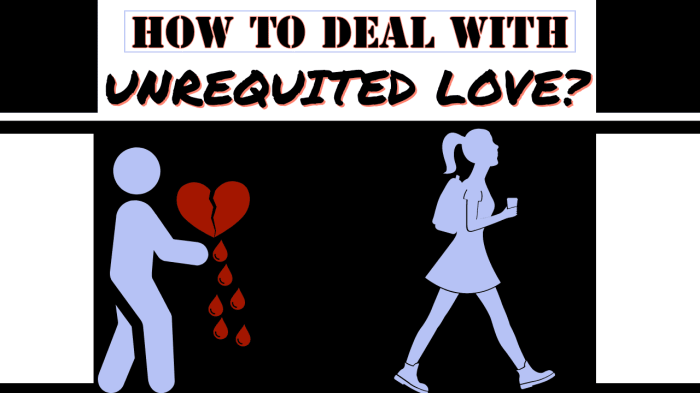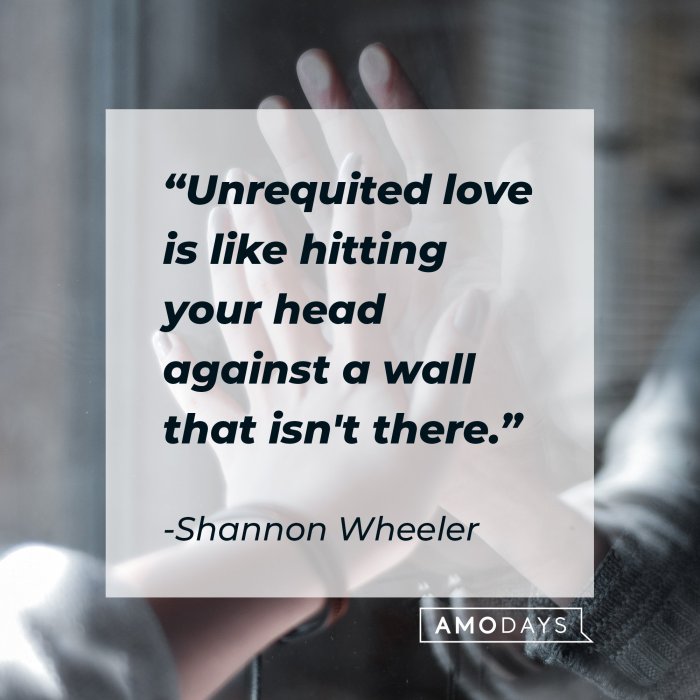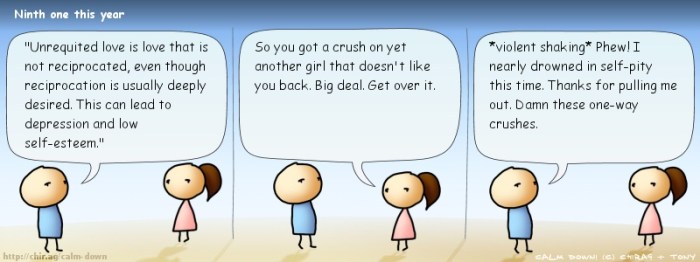For the failure of your unrequited love – Delving into the realm of unrequited love, this comprehensive guide explores the profound psychological and emotional toll it inflicts. The impact on self-esteem, confidence, and relationships is meticulously examined, unraveling the intricate tapestry of this enigmatic experience.
Beyond the pain, this guide offers solace, providing invaluable strategies for coping with unrequited love. It illuminates methods for moving forward and finding closure, emphasizing the crucial role of self-care and seeking support.
Impact of Unrequited Love: For The Failure Of Your Unrequited Love

Unrequited love can have a profound psychological and emotional toll on individuals. The intense feelings of longing, rejection, and unfulfillment can lead to a range of negative consequences.
Self-esteem and confidence can be severely damaged, as individuals may question their own worth and desirability. Relationships with others can also suffer, as unrequited love can create feelings of isolation and withdrawal.
Coping Mechanisms, For the failure of your unrequited love
Coping with the pain of unrequited love requires resilience and self-care. Strategies include:
- Acknowledge and validate your emotions:Allow yourself to feel the pain and sadness, but avoid dwelling on negative thoughts.
- Practice self-compassion:Treat yourself with kindness and understanding, recognizing that unrequited love is not a reflection of your value.
- Seek support:Talk to trusted friends, family members, or a therapist about your feelings. Sharing your experiences can provide comfort and validation.
Causes of Unrequited Love
Unrequited love can arise from a variety of factors:
- Timing:Circumstances may not align for two individuals to be available or interested in a relationship at the same time.
- Compatibility:Differences in values, beliefs, or life goals can create barriers to a fulfilling relationship.
- Personal beliefs:Internalized societal norms or cultural expectations can influence our perceptions of who we are compatible with.
Cultural Perspectives on Unrequited Love
Different cultures have varying attitudes towards unrequited love:
- In some cultures,unrequited love is seen as a noble and romantic ideal, while in others it is viewed as a source of shame or weakness.
- Cultural normscan also influence coping mechanisms, with some cultures encouraging open expression of emotions while others prioritize restraint.
Literary and Artistic Depictions
Unrequited love has been a common theme in literature, film, and music:
| Work | Author/Artist | Theme |
|---|---|---|
| Romeo and Juliet | William Shakespeare | Tragic consequences of unrequited love |
| Unrequited Love | Frida Kahlo | Artistic expression of the pain and longing |
| All Too Well | Taylor Swift | Heartbreak and the lingering effects of unrequited love |
Historical Context
Attitudes towards unrequited love have evolved over time:
- In the Victorian era,unrequited love was often idealized and romanticized, with a focus on the purity and selflessness of the unrequited lover.
- In the 20th century,a more realistic and nuanced view of unrequited love emerged, with an emphasis on the emotional pain and challenges it can present.
Personal Narratives
Personal narratives provide valuable insights into the experiences of unrequited love:
Common themes include:feelings of rejection, loneliness, and self-doubt. However, individuals also report finding strength and resilience in the face of adversity.
Future Research Directions
Further research is needed to explore:
- The long-term effects of unrequited love on mental and physical health
- Effective coping strategies and interventions for individuals experiencing unrequited love
- The role of social and cultural factors in shaping the experience of unrequited love
Clarifying Questions
What are the common causes of unrequited love?
Unrequited love often stems from factors such as timing, compatibility, and personal beliefs. Societal expectations and cultural norms can also play a significant role.
How can I cope with the pain of unrequited love?
Effective coping mechanisms include practicing self-care, seeking support from loved ones or a therapist, and engaging in activities that bring joy and fulfillment.
What are the cultural perspectives on unrequited love?
Cultural attitudes towards unrequited love vary widely. Some societies view it as a rite of passage, while others stigmatize it. These cultural norms influence coping mechanisms and emotional responses.


